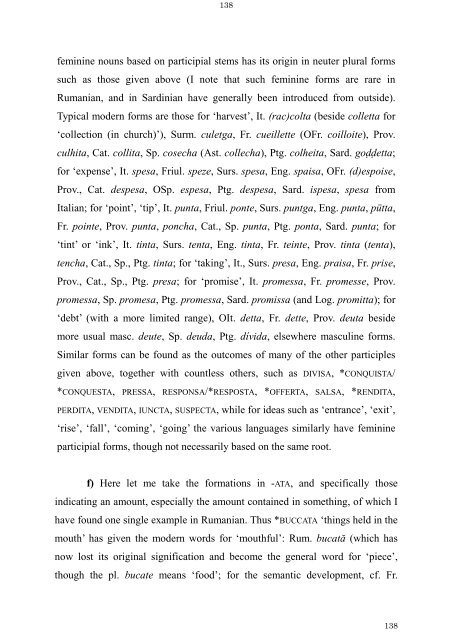The Latin Neuter Plurals in Romance - Page ON
The Latin Neuter Plurals in Romance - Page ON
The Latin Neuter Plurals in Romance - Page ON
Create successful ePaper yourself
Turn your PDF publications into a flip-book with our unique Google optimized e-Paper software.
138<br />
fem<strong>in</strong><strong>in</strong>e nouns based on participial stems has its orig<strong>in</strong> <strong>in</strong> neuter plural forms<br />
such as those given above (I note that such fem<strong>in</strong><strong>in</strong>e forms are rare <strong>in</strong><br />
Rumanian, and <strong>in</strong> Sard<strong>in</strong>ian have generally been <strong>in</strong>troduced from outside).<br />
Typical modern forms are those for ‘harvest’, It. (rac)colta (beside colletta for<br />
‘collection (<strong>in</strong> church)’), Surm. culetga, Fr. cueillette (OFr. coilloite), Prov.<br />
culhita, Cat. collita, Sp. cosecha (Ast. collecha), Ptg. colheita, Sard. goddetta;<br />
for ‘expense’, It. spesa, Friul. speze, Surs. spesa, Eng. spaisa, OFr. (d)espoise,<br />
Prov., Cat. despesa, OSp. espesa, Ptg. despesa, Sard. ispesa, spesa from<br />
Italian; for ‘po<strong>in</strong>t’, ‘tip’, It. punta, Friul. ponte, Surs. puntga, Eng. punta, pütta,<br />
Fr. po<strong>in</strong>te, Prov. punta, poncha, Cat., Sp. punta, Ptg. ponta, Sard. punta; for<br />
‘t<strong>in</strong>t’ or ‘<strong>in</strong>k’, It. t<strong>in</strong>ta, Surs. tenta, Eng. t<strong>in</strong>ta, Fr. te<strong>in</strong>te, Prov. t<strong>in</strong>ta (tenta),<br />
tencha, Cat., Sp., Ptg. t<strong>in</strong>ta; for ‘tak<strong>in</strong>g’, It., Surs. presa, Eng. praisa, Fr. prise,<br />
Prov., Cat., Sp., Ptg. presa; for ‘promise’, It. promessa, Fr. promesse, Prov.<br />
promessa, Sp. promesa, Ptg. promessa, Sard. promissa (and Log. promitta); for<br />
‘debt’ (with a more limited range), OIt. detta, Fr. dette, Prov. deuta beside<br />
more usual masc. deute, Sp. deuda, Ptg. dívida, elsewhere mascul<strong>in</strong>e forms.<br />
Similar forms can be found as the outcomes of many of the other participles<br />
given above, together with countless others, such as DIVISA, *C<strong>ON</strong>QUISTA/<br />
*C<strong>ON</strong>QUESTA, PRESSA, RESP<strong>ON</strong>SA/*RESPOSTA, *OFFERTA, SALSA, *RENDITA,<br />
PERDITA, VENDITA, IUNCTA, SUSPECTA, while for ideas such as ‘entrance’, ‘exit’,<br />
‘rise’, ‘fall’, ‘com<strong>in</strong>g’, ‘go<strong>in</strong>g’ the various languages similarly have fem<strong>in</strong><strong>in</strong>e<br />
participial forms, though not necessarily based on the same root.<br />
f) Here let me take the formations <strong>in</strong> -ATA, and specifically those<br />
<strong>in</strong>dicat<strong>in</strong>g an amount, especially the amount conta<strong>in</strong>ed <strong>in</strong> someth<strong>in</strong>g, of which I<br />
have found one s<strong>in</strong>gle example <strong>in</strong> Rumanian. Thus *BUCCATA ‘th<strong>in</strong>gs held <strong>in</strong> the<br />
mouth’ has given the modern words for ‘mouthful’: Rum. bucată (which has<br />
now lost its orig<strong>in</strong>al signification and become the general word for ‘piece’,<br />
though the pl. bucate means ‘food’; for the semantic development, cf. Fr.<br />
138









